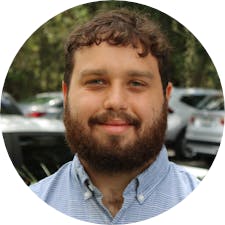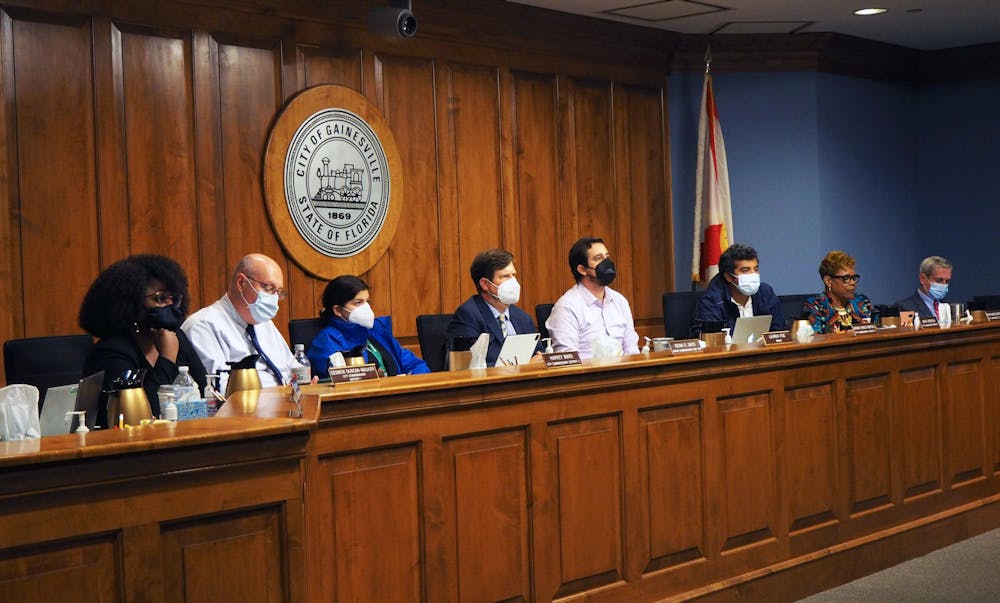After a months-long process marked with dissent from some Gainesville residents and elected officials, the Gainesville City Commission voted 4-3 to eliminate single-family zoning Monday, becoming the first city in Florida to do so.
Once in effect, the ordinance package will allow developers to build two-story multi-family units, like quadruplexes, in formerly single-family residential neighborhoods. It also allows for units to be occupied by more than one family, and it increases the number of bedrooms allowed in units.
Commissioners David Arreola, Adrian Hayes-Santos, Reina Saco and Mayor Lauren Poe voted in favor of the three ordinances; Commissioners Harvey Ward, Cynthia Chestnut and Desmon Duncan-Walker dissented. The vote mirrored the same distribution seen in the ordinances’ first round of voting Aug. 3.
The decision’s long-term benefits outweighed the short-term pressure commissioners faced from opponents, Saco said.
"I trust that with time the community can come to see that this is a good thing," Saco said.
Before the commission voted, Saco removed the sunset provision, which she said would allow residential zoning for three to five years. Without it, the ordinances will take effect quicker.
For those supporting the legislation, the ordinances represent a larger push toward affordable housing and sustainable development with denser housing in single-family neighborhoods, allowing for less impact on the climate.
Joshua Ney, a 49-year-old Gainesville resident of 20 years, said the decision for more units will address environmental and affordability concerns. Ney is the cofounder of Gainesville is for People, which advocates for more housing development to alleviate the housing shortage.
"We believe to have a green and equitable city, we need to have housing [that] folks need throughout their life,” Ney said in public comment.
Supporters pointed to a lack of renter representation in public comment as evidence the public dissent wasn’t unanimous.
The protests and public comments were only part of the public’s larger picture, Arreola said.
“I think folks who both supported it and were against it need to have the humility to recognize that this issue was bigger than them,” Arreola said.
Many residents didn’t share Ney and Arreola’s sentiments, however. Once dissenters realized the vote would swing in favor of eliminating exclusionary zoning, the upset attendees left in droves, slamming the auditorium door — some cursing as they exited City Hall.
Worries of home value depreciation was the root concern of some people like Katheryn Jones, a 49-year-old Gainesville resident of 12 years. She’s struggled with homelessness throughout her life, she said, and she finally became a homeowner in 2010.
As a disabled resident, Jones survives on a fixed income and said she doesn’t come close to the city’s low income affordable housing qualification.
“I am affordable housing, and I can’t afford their plan,” Jones said.
Along with other disabled residents in her neighborhood, Jones said she’ll face the brunt of the zoning elimination’s consequences because she can’t afford for her housing value to drop.
After living in and out of her car for years and duplexes afterward, Jones said her goal was to secure a single-family house for herself — something she now fears will lose its value after the vote.
Opposition to the vote wasn’t only expressed during the meeting. An hour before the meeting, more than a dozen demonstrators gathered outside City Hall, located at 200 E. University Ave., to protest the ordinances.
Residents, multiple November election candidates and a member of the Alachua County Commission voiced disapproval that Gainesville didn’t postpone the vote to January when the newly elected commission will take over.
Some saw it as a last-minute push to secure the vote while approving commissioners still had the majority.
Opponents of the elimination also said current infrastructure wouldn’t support the multi-family units allowed in the repeal of single-family zoning. Additional worries included exacerbated parking difficulties and sewage overuse.
The city should be more transparent about the effects on utilities and transportation and whether developers or taxpayers will bear the financial responsibility, Jones said.
“I refuse to live sandwiched between a couple of two-story triplexes with no parking plans,” she said during public comment.
Duncan-Walker wishes the commission extensively researched the ordinances’ effects prior to the vote, she said, specifically to resolve inevitable infrastructure issues.
“We have no idea how this will really impact our neighbors,” she said.
The Florida Department of Economic Opportunity echoed this position in its Sept. 8 letter to the commission.
“The city does not adequately identify the magnitude of the impact of increasing density,” the letter read.
For both residents and the city commission, the final vote doesn’t mark the completion of exclusionary zoning elimination. Once transmitted, the state has to approve the ordinances before they go into effect.
If rejected, the city could proceed with a lawsuit challenging the decision.
“I know that if we do get administratively or legally challenged, we are in a very strong position to defend the actions we’ve taken,” Poe said.
Members of the public are also considering legal challenges to the city’s decision. Gainesville Neighborhood Voices, the organization that hosted the protest, voiced interest in filing a future lawsuit against the ordinances.
Jean Chalmers, a realtor and former Gainesville mayor, said the decision’s lack of public support and potential destruction of historic neighborhoods makes it worthy of a lawsuit.
"We've raised the money, we'll go to court, we'll win at the state," the 89-year-old said.
Contact Aidan at abush@alligator.org and Mickenzie at mhannon@alligator.org. Follow them on Twitter @Aidandisto and @MickenzieHannon.

Mickenzie is the local elections reporter and previously covered city and county commission for The Alligator’s Metro Desk. She's a fourth-year journalism major and is specializing in data journalism. When Mickenzie isn’t writing, she enjoys watching horror movies, reading, playing with her pets and attending concerts.

Aidan Bush is a fourth-year journalism major and the Summer 2024 Editor-in-Chief of The Alligator. In his free time, he likes to listen to music and go kayaking.






